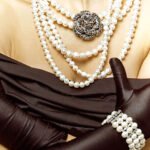Jewellery has a way of talking louder than most people realize. The hoops you wear without thinking, the rings you twist when you are nervous, the necklace you never take off even when you sleep. Each piece is part of a language.
It tells the people around you who you are, or who you want them to think you are. It whispers secrets you might not intend to share, but once jewellery is in place, the story is already out there.
This is not new. Humans have been wearing jewellery for over five thousand years, and every civilization used it as a form of communication. Ancient Egyptians layered gold to declare wealth and connection to the divine. Soldiers in Rome carried rings that marked allegiance. Even in societies where dress was regulated, jewellery often slipped through as rebellion or quiet identity. The small details always spoke the loudest.
Today, the rules have changed, but the effect is the same. You cannot put on a piece of jewellery without making a statement.
The Everyday Earring
Look at your earrings. Are they simple studs? That is restraint. Are they bold hoops? That is energy, maybe even defiance. Are they mismatched? That is a deliberate refusal to play it safe. Earrings frame your face before anything else does. They pull the eye, they adjust balance, they set the tone. A good stylist will tell you that earrings work harder than makeup because they change how the face is perceived instantly.
This is why they have lasted through every cultural shift. When earrings disappeared in nineteenth-century America under conservative dress codes, they came back quickly, each return carrying a touch of rebellion. Punk spikes, grunge safety pins, pearl drops in corporate boardrooms. Each pair tells a different story, none of them neutral.
Rings That Betray You
A ring is small, but it never goes unnoticed. Wedding bands and signets are the obvious examples, but even the casual stack says something. Thin gold rings suggest minimalism. Oversized gemstone pieces hint at drama. The nervous habit of spinning one on your finger speaks louder than you want it to. Rings sit in the center of gestures, so they carry your movements with them.
Anthropologists often talk about rings as identity objects. They mark status, memory, or commitment. But they also betray personality quirks. People who wear rings on every finger read differently from those who keep their hands bare. The hand is one of the first places the eye goes in conversation, which means your rings announce you as much as your words.
Necklaces and the Art of Direction
A necklace guides attention. Short chains draw focus upward, closer to the face. Long pendants pull the eye down, lengthening the body. Layered chains hint at complexity and control, while a single bold piece announces intention. A necklace is rarely casual, even if you wear it daily. It is a deliberate choice about how you want to be seen.
History proves the weight of this decision. Amulets in ancient cultures were believed to protect, to carry the spirit, and to mark a rite of passage. Today, the protection may be less mystical, but the principle is the same. A necklace often becomes the piece people remember you by.
Jewellery as Ritual
Jewellery is not only about being seen. It is also about preparing yourself to be seen. The small ritual of fastening an earring, sliding a ring, or clasping a necklace is a steadying act. Studies on ritual show that repeated intentional gestures increase confidence even when the gesture has no direct practical function. Jewellery works like that.
Think about mornings. Some people skip makeup or dress quickly, but they still reach for jewellery. Even a single piece changes how they walk out the door. The act of putting it on creates rhythm, a pause before entering the world. Jewellery is a tool for identity, but also a tool for stability.
Rebellion at the Lobe
Every culture has tried to regulate jewellery, and every culture has failed. That is part of its power. Piercings were once coded as deviance; now they are fashion. Men wearing pearls in boardrooms would have shocked a past generation; now it is a trend. Each small piece carries potential for defiance, and that is why people keep turning to jewellery as a way to test boundaries without burning bridges.
A necklace can be conservative. A spike earring can be radical. Both sit on the same body, both carry different signals. Jewellery lets people experiment with identity in ways that clothing sometimes cannot.
The Digital Age and Small Details
Most people now meet you first on a screen. Video calls, profile photos, quick scrolls through social feeds. Clothing is often cropped out. Jewellery remains. Earrings are front and center. Rings are visible when you type. Necklaces sit neatly within the frame.
This shift has only amplified jewellery’s importance. Algorithms decide who gets remembered, and distinct details win. Jewellery is one of the few tools left that cuts through the blur. That is why stylists for celebrities and influencers obsess over earrings, necklaces, and rings. The wrong choice can distort balance. The right one can make a face unforgettable.
What You Keep Tells the Story
Every jewellery box is an archive. A pair of earrings from a grandmother. A necklace from a trip abroad. A ring bought to mark a milestone. These objects outlast outfits, outlast trends, sometimes even outlast their owners. Archaeologists dig up jewellery when clothing and buildings have long since disappeared. That permanence makes jewellery unique. It carries memory in metal and stone.
Independent shops thrive on this truth. They curate not for trend-chasing but for longevity. Stores like Made You Look Jewellery build collections that are designed to live with you, grow with you, and carry meaning over decades. Jewellery that is meant to spark conversation, not fade quietly into the background.
Absence Still Speaks
Not wearing jewellery is not neutral either. Bare lobes, unadorned necks, empty fingers: all of these choices are statements. They can signal simplicity, resistance to consumer culture, or refusal to play into expectations. In some cultures, bare skin was once a mark of purity. In others, it suggested poverty. Even today, absence reads differently depending on context. The point is that jewellery always says something, even when you leave it off.
Statement Pieces and Space
Minimalism has had its moment, but it is often a safe choice. Statement pieces carry risk. They take up space, they refuse invisibility. They are not for hiding. A sculptural earring, a bold cuff, a necklace that dominates a neckline, these are pieces that claim attention.
History shows that bold jewellery always comes back. Quiet luxury cycles through, but restraint eventually gets boring. Statement jewellery reappears because people always want a tool that lets them speak without words.
Jewellery That Outlasts
Fast fashion frays. Bags lose shape. Shoes scuff. Jewellery endures. That is why it has always held value not just financially but emotionally. A necklace can become an heirloom. A ring can survive centuries. Even small pieces are built to last.
In a culture addicted to the temporary, jewellery insists on permanence. That is why it matters what you wear, because the piece may outlast you. It will travel through time carrying your story long after other objects fade.
Final Word
What your jewellery says about you is never small. It tells the world who you are, even when you do not intend it. It marks memory, identity, rebellion, ritual. It outlasts trends and often outlasts the person wearing it. Whether you choose minimalist studs, bold statement earrings, inherited rings, or artisan-made pieces, each decision adds another line to the story you are writing.
The mirror you look into every morning is not just reflecting your face. It is reflecting a biography in metal and stone, written piece by piece. Jewellery is not decoration. It is language. And the world is always listening.





Leave a Reply